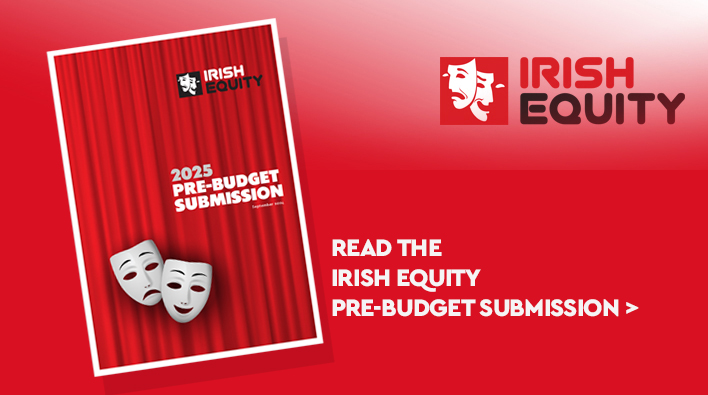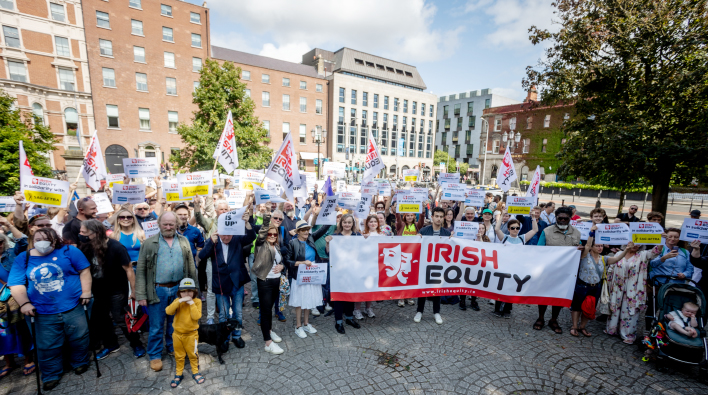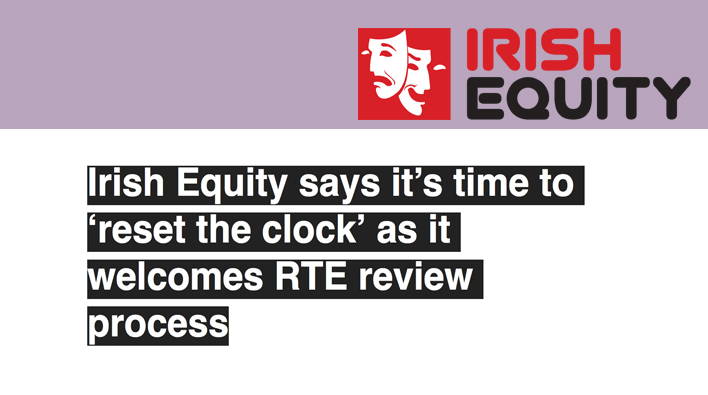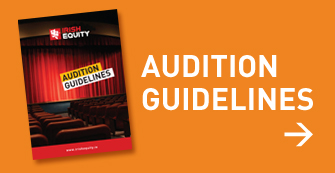Actors to submit petition at Dáil tomorrow calling for an end to film industry exploitation
A petition calling for the recommendations of an Oireachtas report on the operation of the Section 481 tax credit for film makers will be handed to the Government at Leinster House tomorrow.
Irish Equity president, Gerry O’Brien, will submit the petition signed by 3,700 actors in Ireland, the UK, Europe and the US, including a number of Oscar nominees and other award winners at 10.30 a.m. on Tuesday, 3rd October.
The recommendations of the Committee on Budgetary Oversight ‘Report on Section 481 – Film Tax Credit’, were published in May 2023. They propose that Irish performers will not be subject to lesser terms and conditions regarding their intellectual property rights than international performers in similar roles when employed on the same project receiving Section 481 funding.
The Committee recommended that compliance with the Copyright and Related Rights Act 2000, as well as the EU Copyright Directive should be a specified requirement in order to avail of the Section 481 credit.
The Committee committed to writing to the EU commission requesting an examination of the use of ‘buy-out’ contracts in the Irish film production sector as a standard practice as it represents a breach of the rights of performers and artists under the EU copyright directive.
The petition, which is supported by British Equity, the International Federation of Actors (FIA) and US trade union SAG/AFRA, has been signed by actors, Cillian Murphy, Ruth Negga, Colin Farrell, Siobhán McSweeney, David Morrissey, Jonathan Frakes, Jeri Ryan and Adrian Dunbar, among many more.
Gerry O’Brien said: “For decades, Irish actors living in Ireland have been offered contracts by Irish production companies with lesser terms and conditions than those offered to their international colleagues working on the same productions. These contracts have ignored the protections offered to Irish actors by national and international copyright law, denying them access to potential future earnings.
“These practices are unacceptable, particularly when these productions are financed by the public through Screen Ireland, the Section 481 tax credit, the licence fee and more. This petition and its signatories are evidence that this is more than a domestic issue. The eyes of the international audio-visual sector are on Ireland. Irish actors are part of an international community that has no desire to see their hard won rights undermined by these kinds of practices.”

Solidarity Rally with SAG-AFRA and Writers Guild of America
Irish Equity members will hold a solidarity rally at 2.00 p.m. this Saturday (19th August) in support of the SAG-AFTRA and Writers Guild of America strike. It will take place at the Wolfe Tone monument on St. Stephen’s Green and will assemble from 1.30 p.m.
Our members stand in solidarity with the workers involved in the SAG-AFTRA and Writers Guild of America strike.
We have reached a pivotal juncture within the industry worldwide and must act collectively to ensure that all crew, performers, writers and composers are truly valued and share in the success of the industry.
We would encourage all Irish Equity members to attend the rally on Saturday. This is also a call-out to non-union performers and creatives to attend and support the rally.
If you cannot attend the rally in person, you can support it online using the following hashtags: #SAGAFTRAstrike and #SAGAFTRAsolidarity
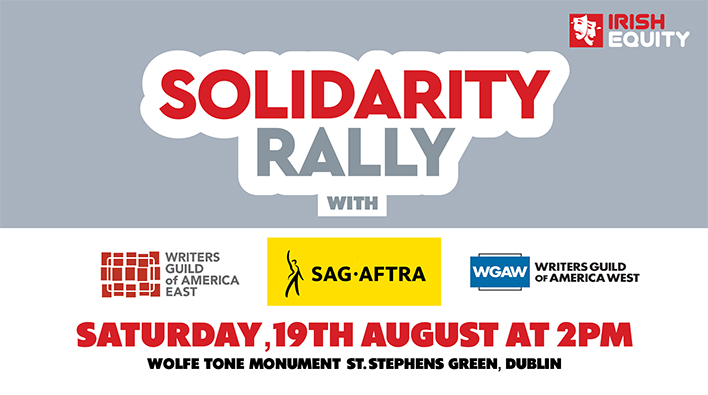
Irish Equity stands in solidarity with SAG-AFTRA and the Writers Guild of America
Dear Members
Please be advised that Irish Equity stands in solidarity with both SAG-AFTRA and the Writers Guild of America.
We believe that, collectively, we have reached a pivotal juncture within the industry worldwide where we must collectively ensure that all Crew, Performers, Writers, and Composers, are truly valued and actually share in the success of the Industry.
This can only be achieved, we believe, by quality agreements, quality jobs, full compliance with legislation and full transparency and accountability within the Industry.
We say clearly to the AMPTP and their members that they need to move significantly and swiftly to meet the reasonable aspirations of SAG AFTRA’s members. The members in Irish Equity and Film & Entertainment, and all entertainment Unions across the globe, create the vast wealth within our industry. Therefore, it is both right and just that they have decent pay and conditions and full adherence to legislation.
Please be advised that whilst Irish Equity stands in total solidarity with our brothers and sisters, we cannot actively participate in their industrial action due to legal constraints. Please note that we are currently not in a dispute situation.
We will of course keep you updated.
Michelle Quinn
Sector Organiser
Irish Equity
Gerry O’Brien
President
Irish Equity
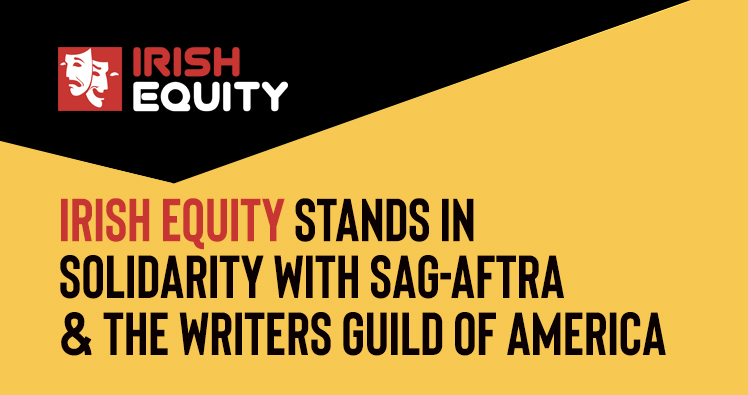
Irish Equity says it’s time to ‘reset the clock’ as it welcomes RTÉ review process
Irish Equity has said that it is time to ‘reset the clock’ at RTÉ and has committed its members to full engagement with the review that has been announced by the Government at the national broadcaster in response to the growing scandal in relation to its governance.
Irish Equity President, Gerry O’Brien, said: “It is of great concern to the Irish Equity Executive and our members that the relationship between the national broadcaster and the entire cultural sector is we believe now in jeopardy. We believe that this has been brought about by the actions of the organisation which have shown a lack of good governance, transparency, absence of good faith negotiations as well as the unilateral alteration of agreements and contracts.
“We are particularly concerned about the terms of engagement displayed by management in relation to in-house productions and towards our members employed in Fair City. Irish Equity has at all times engaged in fair, open and good faith negotiations that ensure a level playing field, this has not be reciprocated.”
He added: “Therefore we welcome the terms of reference for the RTÉ review process.”
Irish Equity Organiser, Michelle Quinn, said: “Our members will fully participate in the review process and stand in solidarity with our colleagues on the RTÉ Trade Union Group.
“Following the conclusion of this process we look forward to a new dawn for our members who work in RTÉ. We hope that what will follow is a new era for the national broadcaster where good governance, accountability, transparency, fairness and good faith negotiations are displayed in both word and deed.
“In order to achieve this outcome a total cultural shift is now required. It is time to reset the clock at in RTÉ.”
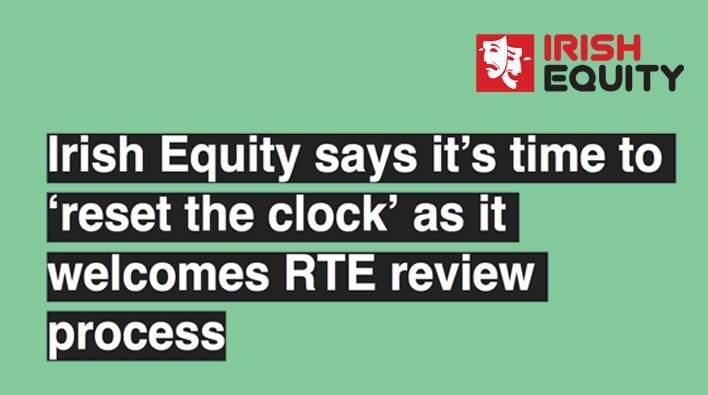
Irish Equity says Ryan Tubridy payments highlight wider transparency issues in RTÉ
The Executive of Irish Equity has expressed deep concern at the undisclosed payments to broadcaster Ryan Tubridy saying that it highlights wider issues surrounding the transparency of governance and operations in RTÉ.
Irish Equity Organiser, Michelle Quinn, said: “The Executive of Irish Equity has stated that it is deeply concerned at the failure of RTÉ to disclose payments made to Ryan Tubridy.
“It has said that what has transpired is totally unacceptable and it is yet another breach of trust with the general public by the national broadcaster.”
She added: “The Executive further stated that the general lack of transparency within RTÉ also impacts members of Irish Equity in a variety of ways. It hampers good faith negotiations and calls into question the integrity of the institution. The Executive also expressed its solidarity with their colleagues in the RTÉ Trade Union Group.”
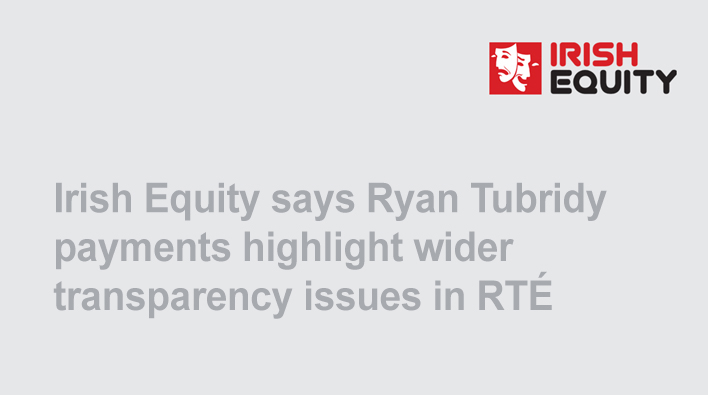
Irish Equity welcomes Oireachtas Committee recommendations on Film Tax Credit
Irish Equity has called for the full implementation of the recommendations contained in a report issued this week by the Oireachtas Committee on Budgetary Oversight concerning the operation of the Section 481-Film Tax Credit, saying they will benefit workers and tax payers.
Irish Equity President, Gerry O’Brien, said: “The report is extremely fair in examining not just the benefits of the film industry to Ireland but also recognising and addressing some of the inequities that exist within it. From our point of view, the implementation of the recommendations surrounding full compliance with the Copyright and Related Act 2000 and the EU Copyright Directive will have a hugely beneficial effect on the lives of all our extremely talented creative workers.
“More importantly, it will protect the investment of the most important stakeholder in our film and television industry, the public. Implementing these recommendations will ensure that we are investing in sustainable careers for all those young people who are beginning their training and looking forward to contributing to our valued creative reputation on the world stage.”
He added: “We fully support all the recommendations contained in the report. The recommended increase in funding for the industry must come hand in hand with full compliance with all legislation that protects the rights of film workers, cast and crew.”
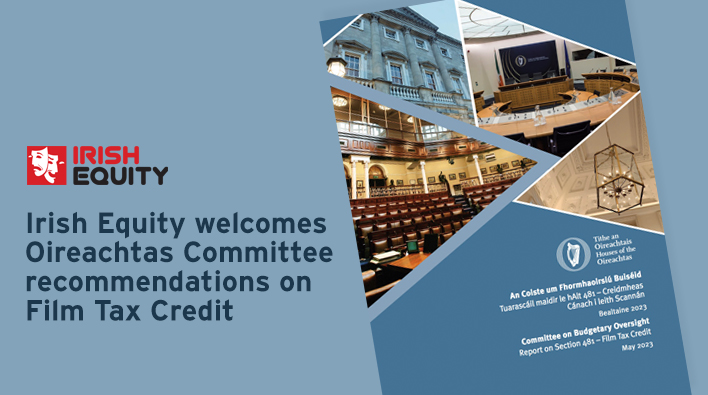
Irish Equity calls for EU protections of intellectual property rights for artists in Ireland
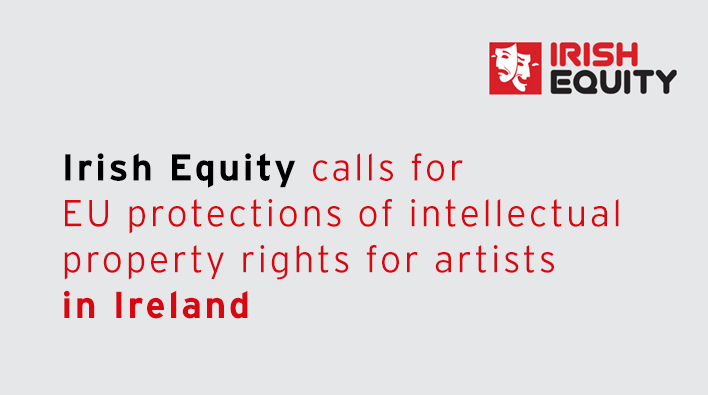
Irish Equity has called for the complete extension to Ireland of EU protections for intellectual property rights for performers in order to end practices which are denying these workers ongoing earnings from their work.
Irish Equity President, Gerry O’Brien, said: “At the recent Annual General Meeting (AGM) of Irish Equity, which took place on 2nd April, two motions were passed relating to copyright in the audio visual industry.
“The motions mandate the Equity executive to call on the Government to do two things. Firstly, to complete the transposition of EU Directive 2019/790 on Copyright in the Digital Single Market into Irish law. Secondly, the Government must include the Copyright Act and this EU Directive in the list of mandatory requirements for applications for the Section 481 tax credit, which seeks to incentivise film and TV production in Ireland, and for all public funding in the audio-visual industry.
“The purpose of the EU Directive is to address ‘the weaker contractual position when authors and performers grant a licence or transfer their rights’. Under the EU Directive, ‘buyout contracts’ are acknowledged as an exception rather than the rule, but for over 30 years Irish performers have been given little choice but to sign these contracts.
“This means Irish performers have not received their rightful residual payments for their work. It also means that there is a wealth of their intellectual property, that still has financial value, tied up in the back catalogues of producers and broadcasters. The EU Directive includes articles that will ensure that performers receive ongoing payments for the use of those works.
“The Irish Equity position on this issue has been supported by the International Federation of Actors (FIA) in a letter in which it states that the provisions of this Directive have not been taken seriously by several EU states, including Ireland.”
He added: “As part of the application for funding under Section 481, producers must sign an undertaking that they will comply with all relevant employment legislation but there is no mention of the Copyright Act. This Act is separate from employment law. It deals with the performers intellectual property rights and materially affects performers’ ability to create a sustainable career. We recommend that compliance with copyright legislation be a listed and mandatory requirement when applying for direct funding and for Section 481 support.”
The Irish Equity AGM also passed motions calling for the minimum rate for live theatre performance to be set at €600 per week and for a restructuring of the union’s theatre agreement to bring it up to date with the hybrid nature of the exploitation of live performance on digital platforms.
